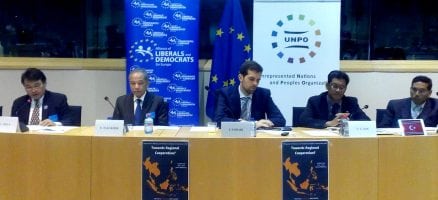The failure to fully implement the CHT Accord has led to widespread human rights violations and Bengali settlers, often with the help of a section of the civil administration and military forces, continue large-scale attacks upon Jumma people with the primary aim of grabbing their land, Ushatan Talkder MP and Vice President of PCJSS says at a conference held in the European Parliament in Brussels.
On 14 June 2016, the UNPO, in collaboration with Mr. Urmas Paet, Member of European Parliament (ALDE) and with the support of the Taiwan Foundation for Democracy (TFD) and the Haella Foundation convened a conference entitled “Prospects for Minority Rights in South East Asia: Towards Regional Cooperation?” at the European Parliament, looking at the current state of, and ways forward for, indigenous and minority rights in South East Asia.
The second panel was dedicated entirely to first-hand accounts of the challenges faced by the Hmong, Acheh, Khmer Krom and Jumma people of the Chittagong Hill Tracts. Member of the Bangladeshi Parliament, Mr. Ushatan Talukder then gave an overview of the effects of the non-implementation of the CHT Accord of 1997. Thousands of acres of lands are being acquisitioned or forcibly taken in the name of declaring reserved forests, leasing land to non-locals for rubber plantation and other commercial purposes, setting up of BGB and military camps and luxurious tourist complexes. These are either recorded lands or lands in possession under the Mouzas or Jums which are managed under the customary laws of the Jummas. These lands are being acquired or forcibly taken over without consulting with or consent from the CHT Regional Council, Hill District Councils, Mouza residents and the concerned landowners. Both Jumma and Bengali people, wanting to protest, are either attacked or threatened. With a view to terrorizing the people, Jumma women and children are raped, killed after rape, and other atrocities are carried out. Jummas are displaced from their ancestral lands through assault, false litigation, and harassment. In Bandarban district, Jumma families from at least 30 villages were evicted and forced to move to elsewhere. As a result, the livelihood of the Jummas in rural areas has crumbled, and they are getting poorer. Moreover, development of tourist centers in the hills and forests, and construction of roads in the remote areas has resulted in the drainage of forest resources. Around 65 Tripura families of two village in Sajek under Rangamati district and 31 Bawm families of Bogalake in Bandarban district, for example, are living under eviction threats due to establishment of tourist center. Eco-diversity and natural environment is getting deteriorated rapidly due to development of road connection. Jumma people consider the development activities which are detrimental to culture, ethnicities, and livelihood of the indigenous Jumma peoples and for that matter the eco-diversity and natural environment should be brought to a halt urgently.
Military atrocities, violence against women, illegal occupation of land, and communal attack on the Jummas by Bengali Muslim settlers under the aegis of the administration, law enforcement agencies and security forces are continuing. The settlers carried out 18 communal attacks on the Jummas after the CHT Accord which resulted in arson attacks, looting and vandalizing of hundreds of Jumma houses, and wounding of hundreds of people. None involved in these attacks have ever been brought to the book. The Jummas are thus forced to live an insecure life.
He said that if CHT becomes a hub of militancy, it leads to severe concern of regional security in South Asia and to abort such situation, support for full implementation of CHT Accord is urgently needed. He urged European Union to provide support for implementation of the CHT Accord for lasting peace & development and to adopt a resolution urging GoB for a roadmap for implementation of CHT Accord and rehabilitation of Bengali settlers outside CHT.
On invitation of Unrepresented Nations and Peoples Organisation (UNPO), Mr. Ushatan Talukder MP and Mr. Mangal Kumar Chakma, Information & Publicity Secretary of PCJSS participated in the Conference on Minority and Indigenous Rights of South East Asia held on 14 June 2016 and back to back conducted the advocacy campaign on implementation of CHT Accord from 13th to 17th June 2016 in Brussels. During the advocacy meetings, the PCJSS delegation was accompanied by Mr. Tommaso Nadori, Programme Coordinator of UNPO and Ms. Elisa Sjödin, Intern of UNPO. PCJSS representatives highlighted the situation of CHT and present state of implementation of CHT Accord as per “Appeal for Proper Implementation of CHT Accord of 1997 for Lasting Peace and Development in the CHT Region” published for this advocacy campaign in June 2016.


